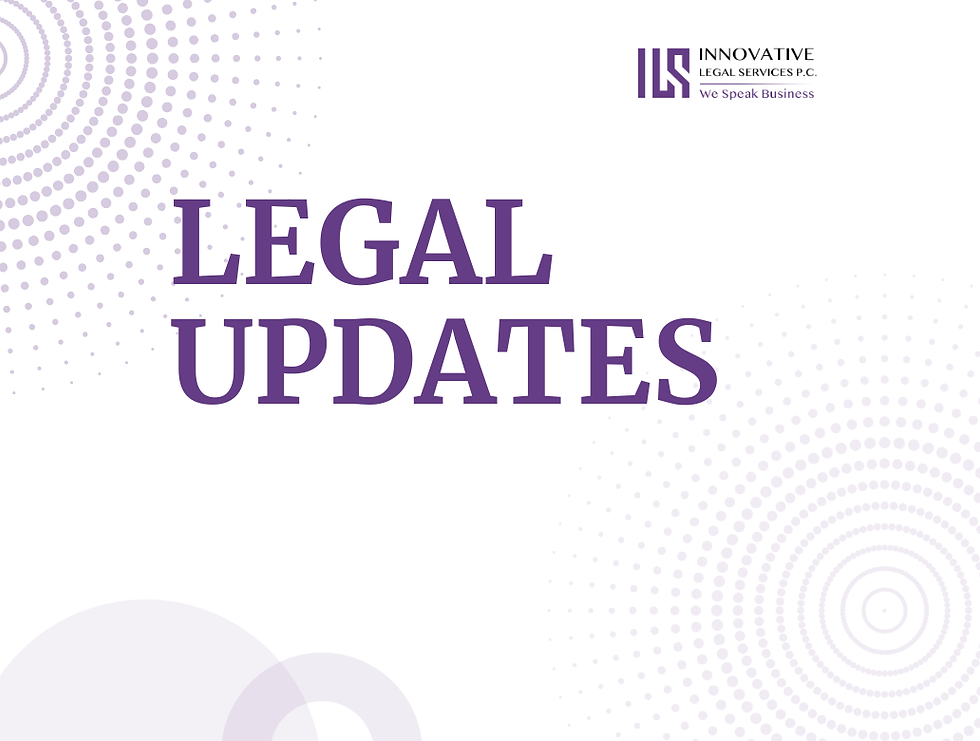New Jersey’s Pay Transparency Law Is Now in Effect: Is Your Business Compliant?
- Contact ILS
- Jun 12, 2025
- 4 min read
Updated: Oct 22, 2025
As of June 1, 2025, New Jersey’s Pay and Benefits Transparency Act (NJPBTA) is officially in force. This significant new law requires employers to disclose compensation and benefits information in job postings and promotion opportunities. Even if your business is not physically located in New Jersey, the law may still apply—particularly if you post jobs accessible to New Jersey applicants or hire remote workers from the state. If your company has not yet taken steps to comply, now is the time to act.
If you have questions about New Jersey’s Pay and Benefits Transparency Act or need assistance reviewing your company’s job posting practices, please contact our Managing Partner, Richard Liu, Esq. at contact@consultils.com.
What Does the NJPBTA Require?
The NJPBTA imposes several key requirements on covered employers, aimed at closing wage gaps and promoting equal access to compensation information. Below are the main compliance elements.
1. Covered Employers
An employer is covered if both conditions are met:
Has 10 or more employees for 20 or more calendar weeks in a year
Maintains a “New Jersey connection”, meaning they:
Do business in New Jersey
Employ workers in the state
Or accept job applications from New Jersey residents
Public agencies, private firms, nonprofits, and employment or referral agencies are all included. Remote and out-of-state employers with these connections must also comply .
2. Job Posting Requirements
For any job posting, whether internal or external, employers must now include:
The hourly wage or salary range the employer reasonably expects to pay for the position;
A general description of benefits, such as health insurance, paid time off, or retirement plans;
A general description of other compensation, including bonuses, commissions, or stock options, if applicable.
These requirements apply to all platforms where jobs may be listed, including company websites, job boards, internal portals, or postings by third-party recruiters. While employers may ultimately offer compensation outside the listed range depending on a candidate’s qualifications, the initial posting must reflect a good-faith estimate.
3. Internal Promotions and Transfers
Before filling a position through promotion or transfer, covered employers must make reasonable efforts to inform all current employees in the relevant department(s) of the opportunity. However, exceptions apply in the following limited circumstances:
When the decision is based solely on seniority,
When the decision is based solely on performance, or
When the position must be filled urgently due to unexpected business needs.
Employers who rely on these exceptions should maintain documentation to justify their decision.
4. Limited Exemptions for Temp Agencies
Temporary help service firms and consulting firms are not required to include pay and benefit details in general advertisements. Instead, they must disclose this information:
During the interview, or
At the time of hire, for a specific temporary assignment.
This limited exemption recognizes the fluid nature of temporary job openings but does not release such firms from overall compliance obligations.
5. Penalties for Non-Compliance
The New Jersey Department of Labor may impose administrative fines for failure to comply:
Up to $300 for the first violation;
Up to $600 for each additional violation.
Each separate non-compliant job posting or promotion notice may be treated as an individual violation, even if the same listing appears on multiple platforms. There is no private right of action under the law. Enforcement is handled solely through the Department of Labor.
Compliance Checklist: What Employers Should Do Now
Review Pay Structures: Identify and document salary ranges and standard benefits for all roles subject to posting or promotion.
Update Job Postings: Revise job templates and advertisements—internal and external—to include required pay and benefits information.
Establish Promotion Protocols: Implement internal procedures to notify eligible employees of promotion opportunities, unless exceptions apply.
Train HR and Recruiters: Ensure your HR and recruiting teams understand the law and apply consistent practices in postings and promotions.
Conduct a Pay Equity Audit: Evaluate internal pay equity with legal counsel to identify and address any disparities, while preserving confidentiality.
Monitor Multi-State Compliance: If you hire across jurisdictions, track and align with pay transparency laws in other states and cities to maintain compliance nationwide.
If you have questions about New Jersey’s Pay and Benefits Transparency Act or need assistance reviewing your company’s job posting practices, please contact our Managing Partner, Richard Liu, Esq. at contact@consultils.com.
Disclaimer: The materials provided on this website are for general informational purposes only and do not, and are not intended to, constitute legal advice. You should not act or refrain from acting based on any information provided here. Please consult with your own legal counsel regarding your specific situation and legal questions.

As Managing Partner at ILS, Richard Liu ranks among the leading U.S. attorneys in corporate, employment, and regulatory law. He is known for crafting legal strategies aligned with clients’ business objectives and advising Fortune 500 companies, startups, and executives on corporate transactions, financing, privacy, and employment matters across the technology, healthcare, and financial sectors.
Before founding ILS, Richard practiced at top defense firms, where he developed a reputation for anticipating risks and designing strategies that balance protection with growth. He has secured favorable outcomes in contract and intellectual property disputes, represented clients in state and federal courts, and is recognized for combining large-firm expertise with boutique-firm agility. Richard is also a frequent speaker at industry and legal conferences.
Email: contact@consultils.com | Phone: 626-344-8949



Comments